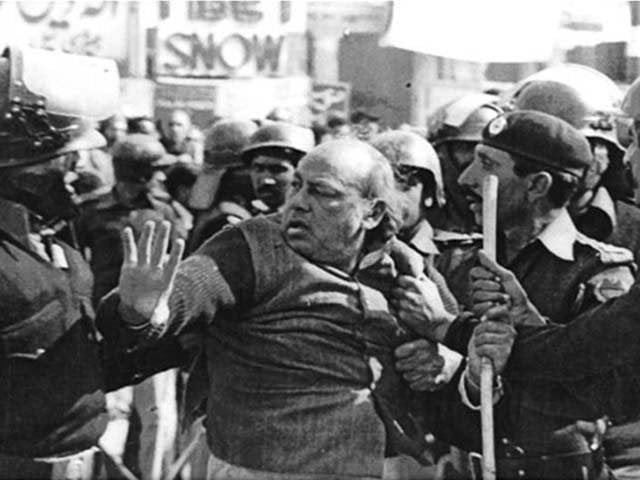Instead, I want to focus today on Jalib’s iconic poem Dastoor (Constitution) which not only became an anthem of protest for a whole generation during Pakistan’s first military dictatorship of Ayub Khan in the 1960s, but gained a new lease of life during the Lawyers’ Movement to restore the then-chief justice against another military dictator, retired general Pervez Musharraf in 2007. More recently, the poem was recited repeatedly by the students in Delhi during the agitation against the Citizenship Amendment Act (CAA) enacted by the Narendra Modi government in India. It is indeed remarkable how a poem which was written against the undemocratic nature of Ayub Khan’s constitution of 1962 ended up providing fuel for fire against another undemocratic act passed in our neighbouring country almost five decades later!
Jalib’s poem was a landmark in the democratic struggle of Pakistan in the 1960s, since more than academic treatises, it was this poem which conveyed to the ordinary man the substance of a document which for many people was just a mystical piece of paper with little value. So this poem enhanced the democratic consciousness of the masses at a crucial time in Pakistan’s history and exposed the elitist nature of the constitution. Jalib’s career as a peoples poet fundamentally began with this poem. This poem was included in his second poetry collection Sar-e-Maqtal (Near the Slaughterhouse), four editions of which were published in one month and were confiscated. According to prominent journalist Mujahid Barelvi, who knew Jalib well and spent many a time as a fellow jail inmate of Jalib, the circumstances of revelation of this poem were that an all-Pakistan mushaira used to be held annually on a big scale in Murree. By this time, Jalib was beginning to be invited to mushairas as a reciter of ghazals. In those days, the rhythm of Zehra Nigah and Jigar Moradabadi was much renowned. Jalib’s rhythm was also a great reason for his popularity. While strolling on the Mall Road in Murree, Jalib met Justice Sardar Iqbal who was the president of that mushaira. The Justice asked Jalib,
“Well, which ghazal are you reciting tonight?”
Jalib replied,
“Justice sahib! Today I am reciting a poem Dastoor….this constitution of Ayub Khan which has appeared right, on that.”
The Justice said to Jalib,
“Don’t do this. Otherwise not only will your entry in Murree be banned but you will also go to jail.”
By that time, the atmosphere had become anti-Ayub. It was after the eminent, humorous poet Zareef Jabalpuri had gathered a lot of praise for his poetry that Jalib was invited by the organiser of the mushaira, Karam Haideri. Jalib said, addressing Justice Sardar Iqbal, the president of the mushaira and the chief guest, the deputy commissioner,
“Today I will recite a political poem called Dastoor.”
And after saying that he just recited the stanza,
“Such a system, such a light-starved dawn/I do not agree with! I do not abide!”
when the crowd of thousands became uncontrollable. At the end of the poem when Jalib descended the stage, he was taken outside by a procession. The poem spread like wildfire across the country. And after that, Jalib was sent to jail for the first time. But the arrest was not made for this poem, and he was instead accused of knifing Waris, a famous goon of Lahore. According to the police, Jalib had borrowed some money from Waris for gambling and to listen to songs. When Waris asked for the money to be returned, Jalib, who was drunk, attacked the goon with a knife.
When the case was prosecuted in a court of Lahore, eminent lawyer Mian Mahmud Ali Kasuri stoodin defence of Jalib. Kasuri addressed Justice Aslam Riaz before the court saying,
“Sir, I know Jalib and his family. What to talk of a knife, he has never even winked at anybody.”
The the governor of West Pakistan, the Nawab of Kalabagh, had ordered for Jalib not to be released from jail, but the newspapers made so much fun of the case that the government had to release Jalib due to sheer embarrassment. Nonetheless, he was re-arrested after just a few days for ‘endangering the peace’. After this poem became famous, it became difficult for the organisers to invite Jalib whenever a mushaira was held in any city. It is true that the loudest and most consistent voice against military dictatorship in then-West Pakistan was Jalib’s, and that Dastoor is the greatest Urdu poem written against the Ayub Khan dictatorship.
So this historic poem is being shared here in translation not only to commemorate one of Pakistan’s greatest resistance poets on his 92nd birthday but to pay obeisance to one of Urdu’s most popular poems given the renewed interest in it, especially among younger people of a different generation who may have missed the historic context in which it was initially written.
“That which lights lamps only in palaces
That which caters to the whims of the elite classes
That which flourishes in the shadow of all compromises
Such a system, such a light-starved dawn
I do not agree with! I do not abide!
I too am not afraid of the scaffold
I am Mansoor too, let the outsiders know
And how dare you scare me with talk of dungeons
This talk of tyranny, this ignorance dark as night
I do not agree with! I do not abide!
You tell me that flowers are blooming on trees
You tell me that the thirsty have found wine at taverns
You tell me that the tattered robes are now stitched
This open lie, this robbery of the senses
I do not agree with! I do not abide!
You have robbed us of our peace for centuries
But your spell has now been broken finally
Do not pretend to be the healer of wounds
You are no physician, others may believe you so, but
I do not agree! I do not abide!”



COMMENTS
Comments are moderated and generally will be posted if they are on-topic and not abusive.
For more information, please see our Comments FAQ